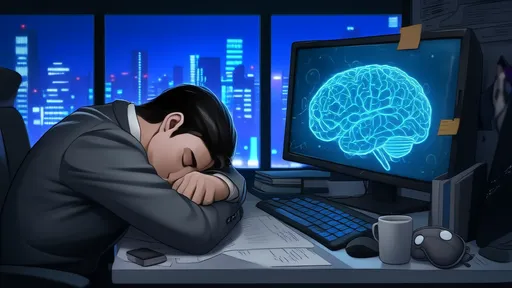The fluorescent glow of computer screens burns late into the night across China's tech hubs as programmers tap away at keyboards, chasing deadlines in a grueling race against time. What began as an unofficial industry practice has snowballed into a cultural phenomenon with deadly consequences – the "996" work schedule (9am to 9pm, six days a week) is literally squeezing the life out of China's workforce.
Behind the glittering facade of China's economic miracle lies a disturbing trend: otherwise healthy professionals in their 20s and 30s collapsing at their desks, victims of sudden cardiac arrest after months or years of chronic overwork. These aren't isolated incidents – medical journals report a 60% increase in stress-induced cardiomyopathy cases since 2015, with tech workers comprising the majority.
The Silent Epidemic
Cardiologists describe these deaths as particularly insidious because they strike without the traditional warning signs. "We're seeing perfectly fit individuals with no prior heart conditions experiencing ventricular fibrillation after prolonged sleep deprivation," explains Dr. Liang Wei from Peking Union Medical College Hospital. "The heart simply gives out – it's not a blockage, but an electrical system failure from accumulated exhaustion."
Autopsy reports reveal disturbing patterns: enlarged hearts weighing 20-30% more than average, a telltale sign of chronic adrenaline overload. Microscopic examination shows myocardial fibers stretched beyond their elastic limit – the cardiac equivalent of a rubber band that's lost its snap.
Cultural Collision Course
The 996 culture didn't emerge in a vacuum. It's the toxic byproduct of China's breakneck development colliding with Confucian work ethic and modern corporate greed. Young professionals speak of "face" pressure – the unspoken rule that leaving before the boss constitutes professional shame. Compensation structures often tie 80% of bonuses to "dedication" metrics measured by late-night presence rather than actual productivity.
Perhaps most disturbingly, the phenomenon has spawned its own perverse mythology. Tech forums glorify "coding to death" as the ultimate professional dedication, with viral posts celebrating engineers who literally worked themselves into early graves. Memes circulate showing hospital IV bags labeled "programmer fuel," while e-commerce platforms sell "996 survival kits" containing energy drinks and adult diapers.
The Physiology of Exhaustion
Medical researchers have mapped the precise biological cascade triggered by chronic overwork. After 18 consecutive waking hours, cortisol levels remain elevated at 37% above baseline – comparable to levels seen in soldiers in active combat. By the 60th hour of a workweek, the adrenal glands begin hemorrhaging norepinephrine, forcing the heart to beat 22% faster even at rest.
Sleep deprivation compounds the damage. Missing just 90 minutes of nightly REM sleep for two weeks reduces coronary artery elasticity by 32%, according to Tokyo University studies. The resulting micro-tears in blood vessels become nucleation points for deadly clots.
Corporate Gaslighting
Despite mounting evidence, many companies continue to frame the issue as one of personal resilience rather than systemic abuse. HR departments distribute pamphlets on "stress management" while maintaining policies that make relaxation impossible. Some firms have introduced nap pods – conveniently ignoring research showing 20-minute breaks can't reverse damage from 80-hour weeks.
Even more insidiously, several major tech firms have begun requiring pre-employment cardiac stress tests, not to protect workers but to screen out those with potential vulnerabilities to overwork. It's a dystopian twist – rather than making workplaces safer, they're seeking employees who can endure more abuse.
Globetrotting Toxicity
While China's situation is particularly acute, the 996 mentality has begun metastasizing globally. Silicon Valley startups now brag about "China-mode" sprints, while European gig economy platforms increasingly adopt algorithmic management systems that punish workers for taking breaks. The World Health Organization's recent classification of workplace burnout as an occupational phenomenon came too late for thousands.
In Tokyo, karoshi (death by overwork) cases now include foreign finance professionals adopting local work habits. London hospitals report a spike in young bankers presenting with Takotsubo cardiomyopathy – the "broken heart syndrome" typically seen in elderly trauma patients.
Resistance and Hope
Grassroots movements are pushing back. The "996.ICU" GitHub repository (where "ICU" ominously stands for the intensive care unit) crowdsources abusive company practices, while labor activists creatively exploit China's own labor laws – which technically limit work to 44 weekly hours – to file strategic lawsuits.
Some companies are discovering that humane policies actually boost productivity. A Hangzhou AI firm that switched to mandatory 36-hour weekend breaks saw project completion rates improve by 18%, as fresh minds produced better code in less time. Neuroscience confirms this – rested brains show 40% greater problem-solving capacity in fMRI studies.
The heart, it turns out, keeps score. Each skipped lunch, each all-nighter, each suppressed bathroom break leaves microscopic scars. In conference rooms where "dedication" is measured in overtime hours rather than results, human lives have become the unacknowledged cost of doing business. As the body count rises, workers worldwide are realizing no paycheck is worth trading sunrise jogs for sunrise funerals.

By /Jun 11, 2025

By /Jun 11, 2025

By /Jun 11, 2025

By /Jun 11, 2025

By /Jun 11, 2025

By /Jun 11, 2025

By /Jun 11, 2025

By /Jun 11, 2025

By /Jun 11, 2025

By /Jun 11, 2025

By /Jun 11, 2025

By /Jun 11, 2025

By /Jun 11, 2025

By /Jun 11, 2025

By /Jun 11, 2025

By /Jun 11, 2025

By /Jun 11, 2025

By /Jun 11, 2025

By /Jun 11, 2025

By /Jun 11, 2025